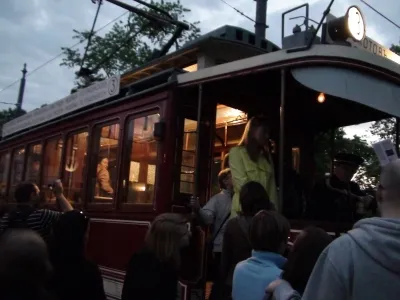And has anyone ever given any thought to how much time we spend in public transportation, let’s say, a day? A month? A year? A lifetime, finally? We get gigantic numbers! Cars and motorcycles, buses and taxis with their fixed routes – they all have become an inseparable part of our lives, which means that also the time spent behind the wheel or in the passenger’s seat must pass with comfort and all amenities. Passengers’ comfort is a complicated thing. Just like a giant jigsaw puzzle, it consists of hundreds of components, one of which is the interdependence between the passengers and the ticket inspector. It might seem that almost all European countries have already moved on towards the automatic fare control system: without ticket inspectors, without the constantly repeated phrase “you’ll pay for the fare.” Only, there is one small country, in which the public transportation control remains unchanged, just like its president. Now I will try to introduce you to how its looks like in Belarus, dear reader. I’m just riding on the bus, not disturbing anyone, I stand, I do not take a seat, so that the old ladies didn’t complain about all seats being taken. I enjoy the sounds of classic hard rock which come from the headphones and I observe fast-changing winter landscapes in the window. Suddenly I’m startled by a violent tap on my shoulder.
Being hardly able to hold my bag, I turn around and I see a smiling, “kind” auntie, whose words I can hear through the headphones: “So, have you paid the fare?”. I turn around to find the wallet with the ticket in my bag. Clutching the leather handle with my right hand and holding the bag in my left hand, at the same time trying to find my monthly ticket, I feel the tap again and I hear the comment to it, even louder: “Could you hurry up?!”. In such chaos, barely standing on my legs, I’m just trying to find this goddamn ticket, and the auntie at the back carries on: “Could you give me the money faster?!” Suddenly, the door before my face open and the crowd of people takes me out to the stop at which you have to leave the bus. I could only hear the hospitable ticket inspector says farewell to me, using “nice” words.
I saw another incident one time on the bus. A morning bus – totally packed! Lots of people! Through narrow entrances, blocked with people, an auntie – ticket inspector weaves her way, pushing the citizens at the windows. I don’t know where such rightness comes from, but it does exist. Every other, no, every female ticket inspector has the figure of 180-120-180. And here comes Thumbelina, from one end of the bus to another (you literally lie on the passenger standing or sitting next to you), shouting: “pay for the fare!”, “overpay for the fare”, “we preoverpay the fare”, anything, in general, except for the correct form. Suddenly, with her attentive eye, the auntie-inspector, sees her new victim – a student. She comes to him ostentatiously and screams at the top of her lungs: “Give me that, give me that, don’t be shy! Ah, sit here!”. After dealing with one victim, she started to “attack” others: “Where’s the monthly ticket, what monthly ticket? Present it, show it. I can’t see any ticket here!”. The poor passenger had nothing else to do but to present acrobatic tricks: swinging through the entire bus, you have to get the fare. Seeing that the fare has been actually paid, “Thumbelina” moved on. At the bus stop, new people entered the bus and the auntie-inspector approaches the passengers once again, asking: “What fare have you paid?”.
In Poland it is completely different. There are no ticket inspectors who walk through the bus for hours during the ride, ruining the mood of themselves and the passengers. In Poland, if you’re lucky, you might even not pay the fare and no one will tell you anything, but if you get caught by “choppers,” you’ll have no other option but to pay the fine. Unfortunately, the fine is quite high. At least everyone has a choice: whether to pay and ride in peace, or whether to pay a fine someday.
But, no matter how ridiculous or pitiful it is, as they say, “it’s good to be a guest, but it’s better to be home.” We all understand that the job is not so easy and that it demands responsibility, attention and equally much restrain. If, each morning, instead of “nice” words, people gave each other a smile, maybe life would be easier.
Nastassia Biarnatskaya
Translated by: Mateusz Pazdur







































